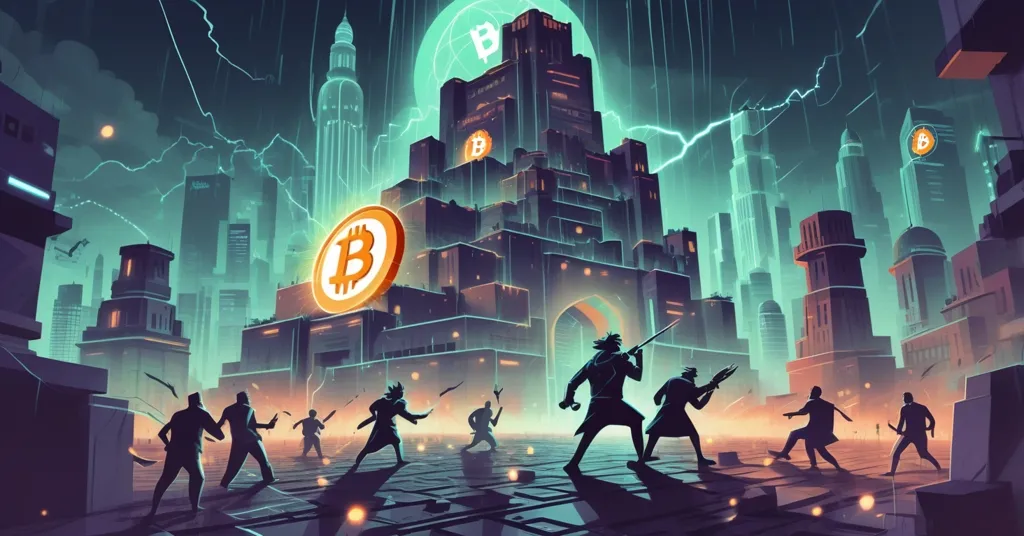CoinDCX Rejects Coinbase Buyout Rumors Amid India’s Crypto Hacks and Regulatory Chaos

CoinDCX Denies Coinbase Acquisition Rumors Amid India Crypto Regulation Crisis and Hacks
CoinDCX, India’s pioneering digital asset unicorn, has firmly rejected swirling media speculation about being in advanced acquisition talks with U.S.-based cryptocurrency giant Coinbase for a deal pegged under $1 billion—a stark contrast to its peak valuation of $2.2 billion in 2022. This denial lands in the midst of a perfect storm for India’s crypto sector, battered by massive hacks, regulatory quicksand, and shaken user trust.
- Acquisition Refuted: CoinDCX dismisses reports of a Coinbase buyout at a discounted valuation.
- Security Breaches: A $44.2 million hack in 2024 rocks CoinDCX, while competitor WazirX loses $235 million.
- Regulatory Stranglehold: India’s harsh taxes and lack of clear laws cripple the crypto market’s growth.
CoinDCX Stands Defiant Amidst Valuation Slump
The rejection of acquisition rumors by CoinDCX isn’t just a press statement; it’s a bold stand against surrender in a market where the odds seem stacked against Indian exchanges. Having soared to unicorn status in 2021 with a $90 million funding round that valued it at $1.1 billion, and further raising $135 million in 2022 to hit a $2.15 billion valuation, CoinDCX was once a beacon of promise in India’s fintech landscape. But the crypto winter, coupled with domestic challenges, has slashed its worth, with rumored buyout figures suggesting a fire sale. Yet, the exchange refuses to buckle, a sentiment echoed by co-founder Sumit Gupta who took to X to highlight the sheer tenacity required to build in this environment. For the latest on these CoinDCX and Coinbase acquisition rumors, the situation remains fluid.
“Amidst all the noise and media drama, building for crypto in India is tough. Super tough. But entrepreneurs thrive on challenges and there’s unmatched joy in building something meaningful for the country!” – Sumit Gupta, CoinDCX Co-Founder
Gupta’s not wrong—carving out a space for crypto in India takes raw guts, but grit alone can’t shield against the dual threats of cyber predators and taxmen. Is this defiance a strategic play to rally confidence, or a risky refusal to accept a lifeline from a global player like Coinbase? Playing devil’s advocate, a merger could inject much-needed stability and expertise into India’s shaky crypto scene, potentially benefiting users over pride. Yet, for champions of decentralization, CoinDCX’s stand might signal a refusal to let centralized giants dictate the future of Indian digital assets.
Cybersecurity Nightmares: Hacks Expose Vulnerabilities
India’s crypto exchanges are under siege, and the wounds are deep. In July 2024, CoinDCX suffered a staggering $44.2 million loss when a compromised internal operational account was exploited. For those new to the space, a “hack” here means unauthorized access to digital wallets—secure storage systems for crypto assets on the blockchain, protected by private keys akin to impenetrable passwords. If those keys are stolen, funds can vanish into attacker-controlled addresses, often laundered through decentralized services to cover tracks. CoinDCX’s response? A recovery bounty of up to $11 million, calling on white-hat hackers—ethical tech wizards who help recover stolen assets—to step in.
The story gets uglier with WazirX, another major Indian exchange, which lost a jaw-dropping $235 million in the same month, representing 45% of its total holdings. Global law enforcement from the U.S., Japan, and South Korea pinned this heist on North Korea’s Lazarus Group, a state-sponsored hacking crew notorious for treating crypto exchanges like their personal ATM. Blockchain analysis revealed the thieves swapped stolen tokens for Ether, a tactic known as cross-chain crime—stealing on one blockchain and moving assets to another to obscure the theft. For deeper insights into the WazirX hack linked to Lazarus Group, the scale of this breach is staggering. WazirX reflected on this gut punch a year later with a defiant tone on X.
“A lot can happen in one year…Exactly a year ago, WazirX faced a major cyberattack. Global agencies, including law enforcement from the U.S., Japan, and South Korea, have formally confirmed that it was done by North Korean hackers. It disrupted operations, but not our determination. Since then, our focus has been crystal clear: restore trust, distribute assets, and restart operations safely.” – WazirX, on X
State-sponsored hackers in crypto? Welcome to the 21st-century Wild West, where geopolitics gets a blockchain upgrade. These breaches aren’t just technical failures; they’re a screaming alarm about the fragility of centralized exchanges. For more on India’s cryptocurrency hacks in 2024, the pattern of vulnerability is clear. Bitcoin maximalists would argue this is exactly why self-custody—storing your own assets offline in cold wallets—is the only true path to financial freedom. Altcoin advocates might counter that Ethereum-based decentralized finance (DeFi) tools could offer scalable security solutions if Indian exchanges adapt. Either way, user trust in India is at rock bottom, and recovery is an uphill battle.
Regulatory Hellscape: India’s Crypto Chokehold
Hacks are bad enough, but when your own government plays bouncer at the crypto club, survival gets even uglier. Crypto assets in India remain completely unregulated, with no comprehensive legal framework to govern them. Pankaj Chaudhary, Minister of State for the Ministry of Finance, laid bare this policy vacuum in parliament.
“Crypto assets are unregulated in India and [the] government does not collect data on these assets.” – Pankaj Chaudhary, Minister of State, Ministry of Finance
He also underscored the borderless nature of crypto, noting that bad actors exploit differences in rules across countries—a practice called regulatory arbitrage, or taking advantage of varying laws to dodge restrictions. India’s current strategy isn’t regulation; it’s punishment. A 30% tax on profits (with no option to offset losses), a 1% TDS (Tax Deducted at Source, a tax collected upfront on each transaction over ₹10,000 or about $116), and an 18% GST (Goods and Services Tax) on trading fees have gutted domestic trading. A report by Esya Centre estimates this harsh regime could cost India $1.2 trillion in lost trading volume as users flee to offshore platforms. For perspectives on the impact of India’s crypto regulations on exchanges, the stakes are high. That’s not just a tax—it’s a full-on economic exorcism of crypto from India.
The Reserve Bank of India (RBI) adds fuel to the fire, having tried to ban crypto transactions outright in 2018—a move rooted in fears of capital flight post-demonetization, only to be overturned by the Supreme Court in 2020. Their persistent warnings about virtual currency risks continue to spook investors. But let’s balance this critique: some governmental caution is warranted. Crypto’s anonymity can facilitate money laundering, a concern behind India’s inclusion of virtual digital assets under anti-money laundering laws. Yet, the execution—punitive taxes without clear rules—feels more like suppression than protection.
A faint light flickers ahead. In June 2025, the government plans a discussion paper on digital assets, drawing insights from the International Monetary Fund (IMF) and Financial Stability Board (FSB). For more details on the upcoming Indian crypto regulation plans for 2025, progress remains uncertain. But don’t pop the champagne—there’s no firm timeline, and as Chaudhary noted, effective rules need global consensus, which is like herding cats on a blockchain.
Survival Strategies: Expansion and Consolidation
Amid the chaos, Indian exchanges are fighting tooth and nail to stay afloat. CoinDCX isn’t just patching wounds; it’s expanding, acquiring Dubai-based exchange BitOasis in July 2024 to tap into the Middle East—a region with regulatory clarity and pro-blockchain policies that make India look like a medieval dungeon by comparison. Learn more about CoinDCX’s acquisition of BitOasis for Dubai expansion. This pivot signals a broader strategy: if home is hostile, build elsewhere. CoinDCX has also floated interest in acquiring WazirX as of January 2025, hinting at consolidation as a survival tactic. Fewer players, bigger muscle—though that risks less choice for users in an already squeezed market.
WazirX, meanwhile, has partnered with custodial giants BitGo and Zodia Custody to secure remaining assets, secured a moratorium—a legal pause on financial obligations—from the Singapore High Court to reorganize without creditor pressure, and won 93.1% creditor support for its recovery plan. Even CoinSwitch stepped up with a $70 million asset recovery initiative for WazirX users, showing rare industry solidarity. These moves are desperate but necessary to rebuild trust in a market torched by hacks and taxes.
Global Parallels and the Bigger Picture
India’s crypto quagmire isn’t unique, but its flavor of dysfunction stands out. Compare it to China, where an outright ban pushed innovation underground, or El Salvador, where Bitcoin is legal tender and adoption is state-driven. India sits in an awkward middle—neither banning nor embracing, just taxing and ignoring. This limbo stifles growth more than a hard no would. Globally, cyber threats like the Lazarus Group’s antics highlight a shared vulnerability; exchanges everywhere are targets, yet India’s nascent infrastructure and regulatory void make it a juicier mark. Community discussions on platforms like Reddit about CoinDCX and WazirX hacks reflect widespread concern.
Here’s where effective accelerationism—our belief in speeding up tech progress even through pain—comes in. India’s harsh conditions could forge a tougher, more decentralized crypto beast. Think about it: if exchanges collapse under hacks and taxes, users might pivot en masse to self-custody or DeFi platforms on chains like Ethereum, bypassing centralized points of failure. It’s brutal now, but the pressure cooker might birth innovation faster than a comfy regulatory cradle ever could. For additional context on the CoinDCX and Coinbase acquisition speculation, the narrative of resilience continues to evolve.
Key Takeaways and Burning Questions
- Why is CoinDCX rejecting Coinbase acquisition rumors in 2024?
CoinDCX signals resilience, refusing to sell at a discounted valuation under $1 billion compared to its $2.2 billion peak, despite a $44.2 million hack and brutal market conditions in India. - How are cyber hacks crippling Indian crypto exchanges like CoinDCX and WazirX?
Massive losses—$44.2 million for CoinDCX and $235 million for WazirX in July 2024—shatter trust, expose weak security, and tie attacks to state-sponsored groups like North Korea’s Lazarus Group. - What steps are Indian exchanges taking to recover from massive crypto hacks?
CoinDCX offers an $11 million bounty for asset recovery, while WazirX secures custodial partnerships with BitGo, gains a Singapore court moratorium for restructuring, and wins 93.1% creditor support. - Why is India’s crypto regulatory environment so hostile in 2024?
Unregulated assets face crippling taxes—30% on profits, 1% TDS, 18% GST—alongside RBI warnings and no legal framework, potentially costing $1.2 trillion in trading volume as users shift offshore. - Could India’s crypto regulation improve by 2025, and what are the challenges?
A 2025 discussion paper with IMF and FSB input hints at progress, but no timeline exists, and global consensus is needed to tackle borderless issues like regulatory arbitrage, making quick fixes unlikely. - How are Indian crypto exchanges like CoinDCX adapting to survive harsh conditions?
CoinDCX expands globally by acquiring Dubai’s BitOasis, eyes a WazirX buyout, while CoinSwitch’s $70 million recovery fund for WazirX users shows industry solidarity in a battered market. - What does India’s crypto chaos mean for Bitcoin and decentralization advocates?
Bitcoin maximalists see hacks and regulation as proof centralized exchanges fail, pushing self-custody, while altcoin supporters argue Ethereum-based DeFi tools could offer scalable solutions India desperately needs.
India’s crypto battlefield is a high-stakes game with hacked chips and a dealer making up rules on the fly. CoinDCX’s refusal to fold to Coinbase might be bold, but it’s a gamble when the house—cyber threats and regulatory uncertainty—is stacked against them. Is India smothering its digital asset future, or forcing a leaner, more decentralized monster to rise from the ashes? The fight for financial freedom in this market is messy, ugly, and absolutely gripping. Bitcoin’s ethos of cutting out the middleman feels more urgent than ever, even as altcoin ecosystems offer tools for innovation. One thing’s clear: this saga is far from over.



